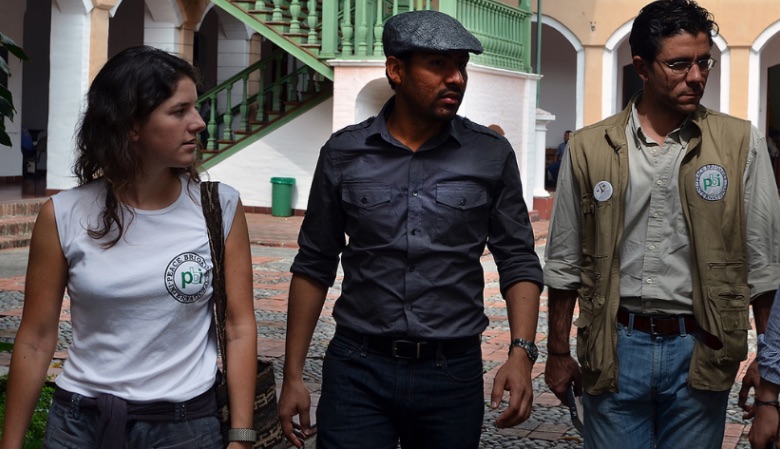Those who work to defend land, water, Indigenous, LGBTQI+ and human rights around the world face many dangers, including death.
According to a recent report by Dublin-based Front Line Defenders, 321 defenders in 27 countries were targeted and killed in 2018 because of their activism.
This is the highest number ever on record and the situation is worsening. As recently noted in Grist, “Instead of dismissing climate-conscious demonstrators as hippies or ‘tree huggers,’ government officials have begun using more dangerous labels — including ‘terrorist.'”
Reported violations against defenders also include detention and arrest, legal action, threats, smear campaigns and verbal abuse, physical attacks, interrogations, raids, travel bans, disappearances, torture and sexual violence.
One way to support these defenders is through protective accompaniment.
According to NGO Peace Brigades International (PBI), “Protective accompaniment is a strategy pioneered by PBI for protecting human rights defenders and communities whose lives and work are threatened by political violence.”
The strategy involves recruiting volunteers from around the world who want to help “defend the defender,” providing them with training, and then sending them into areas of conflict in a highly visible way to provide increased security and moral support to defenders.
Normally volunteers spend a minimum of one year in the field.
“When the level of threat is high accompaniment is sometimes round the clock. In other situations volunteers stay with threatened communities or remain in the offices of organizations, and accompany threatened activists when they travel,” PBI notes. “Another form of accompaniment is regular phone calls to organizations to check on their safety.”
These volunteers are backed by an international network that raises the profile of the defender and their struggle, provides analysis and international solidarity, and increases the stakes and risk of repercussions for potential attackers.
“Accompaniment increases the perceived political costs of ordering an attack in front of international witnesses — witnesses whose organization is committed to making such attacks as costly as possible for those responsible,” PBI notes.
The political costs can be amplified by garnering local, national and international media coverage, mobilizing embassies, governments and international bodies, challenging with facts the official rhetoric that a human rights situation is improving, and making risk-adverse investors aware they could lose money with controversial mega-projects.
Hundreds of defenders have received protective accompaniment over the years.
Those accompanied by PBI have included activists from Indigenous communities, environmental organizations, women’s organizations, trade unions, community organizations, as well as LGBTQI+ activists, journalists, lawyers and relatives of the disappeared.
When U.K. Labour Party leader Jeremy Corbyn presented a human rights award to PBI volunteers last year, he stated, “They’ve people who put themselves in places of enormous danger in many parts of the world. They have done it so that others may be able to speak.”
“Those who speak up against military dictatorships, against unaccountable power, those who defend those who are victims of police states and the violence that goes with them are often very alone,” he said.
Corbyn concluded, “If we want to live in a world where you are able to speak out against injustice, then you have to stand with those who are speaking out against injustice and never, ever be silenced! PBI will always be there to make sure that everyone can speak out.”
For more information on PBI and protective accompaniment, please click here.
Brent Patterson is an activist-blogger who writes this monthly column on inspiring stories of global resistance to neoliberalism and climate change.
Photo: Peace Brigades International
Help make rabble sustainable. Please consider supporting our work with a monthly donation. Support rabble.ca today for as little as $1 per month!




